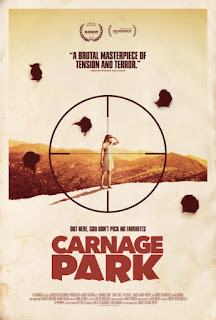Pulp Non-Fiction: "Carnage Park" knows its grindhouse trappings but serves little point
Carnage Park (2016)
81 min., not rated (equivalent of an R).
A pulpy, guns-blasting ’70s-style grindhouse exercise, “Carnage Park” has all the trappings of a drive-in nasty. It’s pitch as black but so stripped-down and stylistically influenced that it never entirely feels like a complete film or its own. It’s almost all bones and little meat. Earlier in the year already, writer-director Mickey Keating made a stylishly creepy Polanski-esque horror film out of “Darling,” but the mood was sustainable. This time, straightforwardness just isn’t enough, and that’s a shame considering there are things to admire. According to the opening text, the film purports to be based on “perhaps the most bizarre episode in the annals of American crime” where the names of the actual people involved had to be changed out of respect, “Fargo”-style. Regardless of that claim, "Carnage Park" never ventures below the surface of a cool-looking genre exercise that has no greater point.
California, 1978. After a botched bank robbery, outlaw “Scorpion Joe” (James Landry Hebert) and his partner in crime, Lenny (Michael Villar), kidnap young woman Vivian Fontaine (Ashley Bell), who was just at the right place trying to have a loan approved and save her family’s farm at the wrong time. Once she is taken out of the criminals’ trunk, things only get worse for Vivian, as her captors unwittingly drive into the desert terrain (read: killing ground) of deranged ex-Vietnam War sniper Wyatt Moss (Pat Healy). The psycho’s brother (Alan Ruck), also the local sheriff, tries to bring Wyatt in, but it’s too late. And that’s about it, really.
From the opening credit sequence, “Carnage Park” has the sun-scorched Western look and feel of a Sergio Leone homage. Then, after a robbery gone wrong, there’s a narrative rewind à la Quentin Tarantino and then it becomes a slasher chase picture. There’s nothing wrong with a bait and switch, but once writer-director Keating wants to take a different direction, he doesn’t seem to take it anywhere of note. Keating is not one to shirk away from the raw violence—a scene only about one-third of the way through where Vivian wakes up handcuffed to a corpse and must free herself is nicely brutal—and the dry desert landscape is always a scarily vast place for bloodshed. A shoot-out that progresses into a chase in a dark, corpse-filled mine shaft comes the closest to really jangling the nerves. Even then, this set-piece is shot in such an unruly manner and too darkly lit to decipher what is going on, rendering the conclusion sorely anticlimactic. The mine shaft setting could not only be taken from the under-celebrated “The Texas Chainsaw Massacre 2” but the last scene, too, where terror grows into hysterical relief.
Before her life is placed in graver danger than losing her house, Vivian sure is tough, giving the condescending bank manager hell. Devoting the right level of hysterics without overplaying it, the doe-eyed Ashley Bell (2013’s “The Last Exorcism Part II”) puts her everything into Vivian, an efficiently drawn part that asks her to go through the emotional and physical wringer but ultimately doesn’t give her much else in return. She is a pretty capable heroine, though. When he’s showing his face or hiding behind a gas mask not unlike the pick-axe killer from “My Bloody Valentine,” Pat Healy is menacing and forbidding, but beyond waxing Biblical, this guy is just cuckoo for Cocoa Puffs. And, yes, at some point, Larry Fessenden does make an appearance.
Even at a scant 81 minutes, “Carnage Park” feels all too repetitive and ultimately inconsequential, striking one note ad infinitum. Director Keating’s attention-getting deftness behind the camera is never in doubt, but his screenplay seems to lack the context needed for any of the savage violence to feel satisfactorily earned. Still, from a production standpoint, the film is as close to top-notch as a low-budget cinematic affair can get, with Mac Fisken’s razor-sharp cinematography at the top of the list and Giona Ostinelli’s disconcerting score not far behind. Keating does have talent, but his films could eventually take the risk of feeling like mere imitations rather than the genuine article, no matter how gnarly the carnage.
Grade: C










Comments
Post a Comment